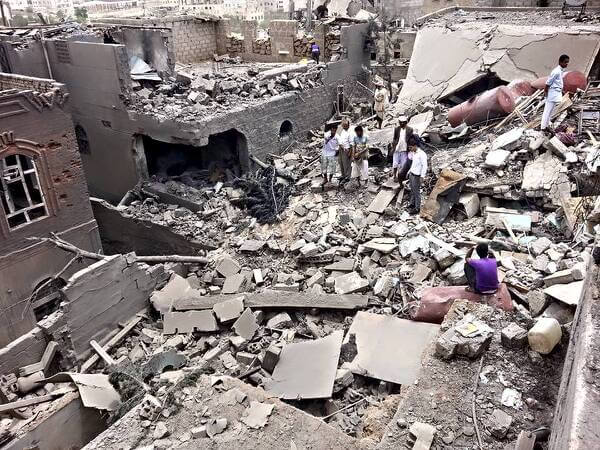

We, the signatories named below, are a group of human rights defenders in the Middle East and North Africa. Whereas we firmly believe in the Universal Declaration of Human Rights and international human rights conventions, we seek, through this reference, to disseminate, promote, and defend the values, principles, and standards of human rights in the Middle East and North Africa, and in all countries of the world.
As a matter of our legal responsibility, we follow with great concern the ongoing war in Yemen, which began in September 2014 when the Ansar Allah militia, in cooperation with former President Ali Abdullah Saleh’s forces, captured the Yemeni capital and invaded the rest of Yemen’s provinces, including the cities of Taiz and Aden. In response, a Saudi-led Arab military coalition launched an air campaign against the Ansar Allah militia and their allies starting on March 26, 2015.
While all appeals and attempts to stop the war have failed to date, violations of ceasefires reached by both sides continue. Hence, we hereby express our grave concern regarding the deteriorating humanitarian situation in the country, as well as the appalling conditions endured by the civilian population in the various provinces of the country. We also condemn the carelessness with which all parties to the conflict treat the war’s destructive and disastrous humanitarian impacts.
The humanitarian consequences of this war are grave. More than 4,500 people have been killed, including 400 children, and over 23,000 people have been wounded. About 80% of the population is in urgent need of vital humanitarian and medical aid, including commercial imports such as food and fuel. The Saudi-led Arab coalition blockade on Yemen has prevented the arrival of such supplies and assistance, further compounding the suffering of civilians. The situation is especially critical as Yemen imports about 90% of its food and fuel from outside the country. This has led to food insecurity for more than half of the population, and over 15.2 million people need basic healthcare. More than 20 million Yemenis are deprived of the most basic humanitarian supplies – a condition that has contributed to the spread of diseases and epidemics.
These dire conditions are further exacerbated by the continued use of internationally prohibited weapons. As a result, the suffering of Yemeni children continues, with an average of eight children killed or maimed every day. This situation has prompted the United Nations Children’s Fund (UNICEF) to repeatedly issue warnings about the catastrophic conditions endured by Yemeni children.[1]
According to many international human rights organizations as well as international humanitarian organizations, such as the International Committee of the Red Cross, all parties to the conflict in Yemen have committed serious violations of international humanitarian law and human rights law, some of which may amount to war crimes.
Based on all of the above, we call in this urgent appeal to the UN Human Rights Council to form an international fact-finding commission to thoroughly investigate the allegations of serious violations of international humanitarian law and international human rights law committed by all parties to the conflict since September 2014. This investigation should include:
We also call for the adoption of an urgent international mechanism to investigate human rights violations committed in Yemen by all parties to the conflict. This mechanism should be conducted in a manner that documents the facts, collect and preserve the information relating to these violations, and ascertain the identity of those responsible for committing them in order to ensure bringing them to justice in international fair trials.Signatories:
Contact Information
Email: manea@pw.uzh.ch
Email: fadi.qadi@gmail.com
Email: alfaqihr@mwatana.org